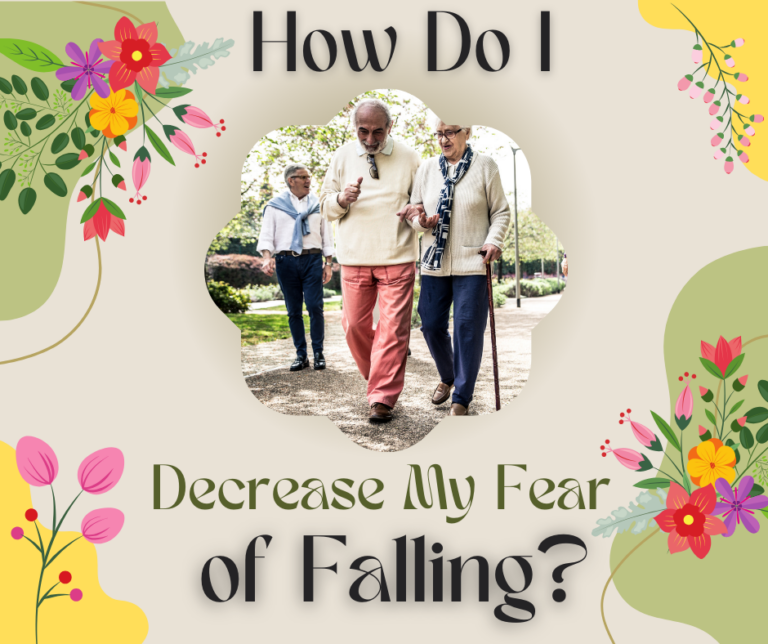The fear of falling is a normal concern for an older adult, especially if you have had falls in the past. It is understandable that you may be fearful, but you don’t want that fear to decrease your safety or get in the way of doing things you love to do!
A few points to address when wondering how to reduce your fear of falling, are:
- Continue to stay active
- Practice relaxation techniques
- Have a plan in place, should you fall
- Talk with someone about your fears/anxiety with falling
- Set small and achievable goals to help increase your confidence
- Identify what is causing falls and then how to prevent them
(NHS, 2021)
The fear of falling can grow as your balance decreases, increased issues arise with your inner ear, decreased vision, and the sense of touch in your feet decreases. The fear continues to grow as these issues arise, which can in turn increase the risk of because you fixate on one thing and don’t factor in additional obstacles. (Cleveland Clinic, 2017)
A study was performed in 2021, with adults sixty five years and older. This study focused on how the fear of falling impacts older adults. The study had two waves; in the first wave, each individual’s fear of falling and overall balance was recorded. In wave two, a year later, the study identified if there were any falls with the participants. What the study found is that participants that had a greater fear of falling in the first wave, did not improve their balance in the second wave, due to being overly fearful. The fear actually increased the fall risk for participants in the study. (Garbin, Fisher, 2021)
What does this study show us? Having increased fear doesn’t necessarily make someone more cautious, which would in turn increase their safety. The increased fear actually can negatively affect an older adult and increase their fall risk! What can you do to help decrease this fear? Let’s expand more on the points addressed above.
Have a fall plan – Figure out how you will go about getting help. Either having a cellphone/phone on you or using a personalized alarm. If you are calling a friend or family for help, make sure you have a way for them to get into your home, prior to the fall happening. Also, discuss with your loved ones what your fall plan is. (NHS, 2021) Set small, achievable goals – Set a goal to make a certain amount of steps per day or go up/down a certain amount of stairs a day. Set small goals so they can be completed sooner than later, so you can continue to build on them. (NHS, 2021) Stay Active – continuing to stay active or adding activity to your day, will help increase strength, which in turn can increase balance. Try exercises like yoga, tai chi, and stretching. (NHS, 2021)
Identify what could be causing falls – Think back on when you had a fall. Were you rushing somewhere? Was there a rug in that spot that your foot often catches on? Were you feeling lightheaded or did you not utilize your walking device? If any of those questions or any other questions come to mind from a fall, being able to address the root of the problem could prevent future falls! (NHS, 2021) Talking with someone – either a loved one, friend, or even a counselor, can help you voice out loud what your concerns are. Having someone to talk through it with may make it seem more manageable. (NHS, 2021)
Work with a physical (PT) and occupational therapist (OT) – OT and PTs can help you work on improving your balance, increasing your strength, modifying your home environment to decrease trip hazards, and recommend adaptive equipment that may assist with decreasing falls. OT and PT can also work with you, hands on, on how to fall safely or how to get up safely after a fall.
It is understandable that you want to be as safe as possible. But having a fall should not stop you from continuing to live your life as independently as possible, continuing to do what you love. Implementing the tips above and talking with an occupational or physical therapist, can help decrease that fear and increase your safety!
Resources Utilized:
How to deal with anxiety about falling. NHS inform. (2021, September 16). Retrieved May 9, 2022, from https://www.nhsinform.scot/
Cleveland Clinic. (2017, December 28). Do you worry about falling? How to conquer the fear. Cleveland Clinic. Retrieved May 9, 2022, from https://health.
Garbin, A. J., & Fisher, B. E. (2021, August 9). The interplay between fear of falling, balance performance, and Future Falls. Journal of Geriatric Physical Therapy, Publish Ahead of Print. https://doi.org/10.1519/jpt.

